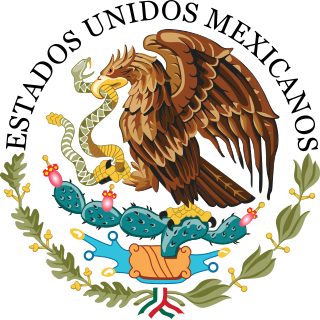
The politics of Mexico take place in a framework of a federal presidential representative democratic republic whose government is based on a congressional system, whereby the President of Mexico is both head of state and head of government, and of a multi-party system. The federal government represents the United Mexican States and is divided into three branches: executive, legislative and judicial, as established by the Political Constitution of the United Mexican States, published in 1917. The constituent states of the federation must also have a republican form of government based on a congressional system as established by their respective constitutions.

The Institutional Revolutionary Party is a Mexican political party founded in 1929 that held uninterrupted power in the country for 71 years from 1929 to 2000, first as the National Revolutionary Party, then as the Party of the Mexican Revolution and finally as the PRI beginning in 1946.

The National Action Party is a conservative political party in Mexico founded in 1938. The party is one of the four main political parties in Mexico, and, since the 1980s, has had success winning local, state, and national elections.

Cuauhtémoc Cárdenas Solórzano is a prominent Mexican politician. He is a former Head of Government of Mexico City and a founder of the Party of the Democratic Revolution. He ran for the presidency of Mexico three times. His 1988 loss to the Institutional Revolutionary Party candidate Carlos Salinas de Gortari had long been considered a direct result of obvious electoral fraud, later acknowledged by President Miguel de la Madrid. He previously served as a Senator, having been elected in 1976 to represent the state of Michoacán and also as the Governor of Michoacán from 1980 to 1986.

Miguel de la Madrid Hurtado was a Mexican politician affiliated with the Institutional Revolutionary Party (PRI) who served as the 59th President of Mexico from 1982 to 1988. During his presidency, de la Madrid introduced sweeping neoliberal economic policies, beginning an era of market-oriented presidents in that country. His administration was criticized for its slow response to the 1985 Mexico City earthquake, and the handling of the controversial 1988 elections in which the PRI candidate Carlos Salinas de Gortari was declared winner, amid accusations of electoral fraud.

José Guillermo Abel López Portillo y PachecoCYC was a Mexican lawyer and politician affiliated with the Institutional Revolutionary Party (PRI) who served as the 58th President of Mexico from 1976 to 1982. López Portillo was the only official candidate in the 1976 Presidential election, being the only President in recent Mexican history to win an election unopposed.

The Party of the Democratic Revolution is a social democratic political party in Mexico.

The National Electoral Council (CNE) is one of the five branches of government of the Bolivarian Republic of Venezuela that was designed to be independent. It is the institution that has the responsibility of overseeing and guaranteeing the transparency of all elections and referendums in Venezuela at the local, regional, and national levels. The creation of the CNE was ratified in Venezuela's 1999 constitutional referendum. Following the election of Nicolás Maduro – Hugo Chávez's handpicked successor – into the presidency, the CNE has been described as being pro-Maduro.

General elections were held in Mexico on Sunday, July 2, 2000.

General elections were held in Mexico on Sunday, July 2, 2006.

Pascual Ortiz Rubio was a Mexican politician and the President of Mexico from 1930 to 1932. He was one of three Mexican presidents to serve out the six-year term (1928–1934) of assassinated president-elect Álvaro Obregón, while former president Plutarco Elías Calles retained power in a period known as the Maximato. Calles was so blatantly in control of the government that Ortiz Rubio resigned the presidency in protest in September 1932.

The 1988 Mexican general election was held on 6 July 1988.

The Maximato was a transitional period in the historical and political development of Mexico from 1928 to 1934. Named after former president Plutarco Elías Calles's sobriquet el Jefe Máximo, the Maximato was the period that Calles continued to exercise power and exert influence without holding the presidency. The six-year period was the term that President-elect Alvaro Obregón would have served if he had not been assassinated immediately after the July 1928 elections. There needed to be some kind of political solution to the presidential succession crisis. Calles could not hold the presidency again because of restrictions on re-election without an interval out of power, but he remained the dominant figure in Mexico.

The Progressive Constitutionalist Party, known by its acronym, PCP, was a liberal political party that existed between 1909 and 1913. Positioned in the centre ground of Mexican politics, it drew ideologically from both social and economic liberalism. The party was formed as the conservative wing of the former Liberal Party which in the early twentieth century had splintered into more radical factions, represented by the PLM.

General elections were held in Mexico on 7 July 1940. The presidential elections were won by Manuel Ávila Camacho, who received 93.9% of the vote. In the Chamber of Deputies election, the Party of the Mexican Revolution won all but one of the 173 seats.

The president of Mexico, officially known as the president of the United Mexican States, is the head of state and head of government of Mexico. Under the Constitution of Mexico, the President is the chief of the executive branch of the federal government and is the commander in chief of the Mexican Armed Forces. The current president is Andrés Manuel López Obrador, who took office on 1 December 2018.

General elections were held in Mexico on 4 July 1982. The presidential elections were won by Miguel de la Madrid, who received 74.3% of the vote. In the Chamber of Deputies election, the Institutional Revolutionary Party won 299 of the 372 seats, as well as winning 63 of the 64 seats in the Senate election. Voter turnout was 74.8% in the presidential election and 72.6% and 66.4% for the two parts of the Chamber elections.

General elections were held in Mexico on 4 July 1976. José López Portillo was the only candidate in the presidential election, and was elected unopposed. In the Chamber of Deputies election, the Institutional Revolutionary Party won 195 of the 237 seats, as well as winning all 64 seats in the Senate election. Voter turnout was 64.6% in the Senate election and 62.0% in the Chamber election.

General elections were held in Mexico on 1 July 2018. Voters elected a new President of Mexico to serve a six-year term, 128 members of the Senate for a period of six years and 500 members of the Chamber of Deputies for a period of three years. It was one of the largest election days in Mexican history, with most of the nation's states holding state and local elections on the same day, including nine governorships, with over 3,400 positions subject to elections at all levels of government. It was the most violent campaign Mexico has experienced in recent history, with 130 political figures killed since September 2017.
Events from the year 1929 in Mexico





















